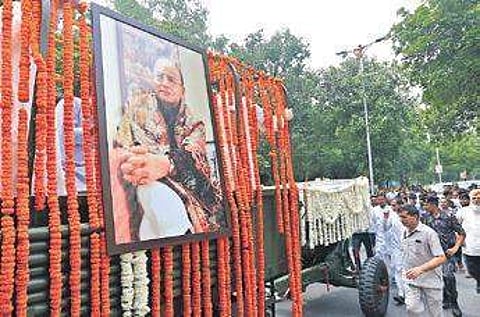

From the benches of Lodhi Gardens to Supreme Court benches, from inner-party chambers to Parliament’s Central Hall — a certain part of New Delhi will not be the same. More than the imposing structural edifices or the grandeur of Rajpath, what breathes life, character and colour to the capital city are the people who inhabit those structures of power and politics. And Arun Jaitley was the ultimate Lutyens insider — the one man who had a deft, definitive influence on what went on across many domains.
Though he lived in South Delhi, except for a brief while when he had to reluctantly shift to a Lutyens bungalow earlier inhabited by George Fernandes, he had a sure spinner’s grip on how politics and power equations in the heart of the Indian republic shaped up in tangible and intangible ways. During Jaitley’s brief stint as a resident there, the bungalow was not quite gateless, but his doors were open for friends, followers and colleagues, both from politics, the legal fraternity and yes, the media.
It’s his accessibility and amiable nature that helped him create a charmed circle, something that served the BJP well in those 10 years in opposition. (Although, early during UPA-II, when a BJP return seemed a dim prospect, he confided to some of us at a private function that he was actively considering quitting politics and running for BCCI president!) In government, the jury will be out on his ministerial talent, especially as Finance Minister in Modi 1.0 — but always in evidence was a suave sharpness, wit and ability to analyse anything from world affairs, legal tangles, cut-and-dried economic issues to food with a riveting, anecdotal savoir-faire.
For those tracking the ups and downs of Indian politics, it was noticeable how the rise of Jaitley’s durbar, so to speak, went in tandem with the slow decline of the Left’s hold over the political discourse, through the phasing out of two such drawing rooms, that of Harkishen Singh Surjeet’s and Somnath Chatterjee’s. And, later the disappearing queues at 10 Janpath. Of course, L K Advani and A B Vajpayee laid the foundation of that shift with their mass appeal, but it was Jaitley and Sushma Swaraj — both 1952-born lawyer-turned-politicians — who built on it and created the atmospherics, with their oratory, gift of the gab and canniness.
Not a Man Friday, he was the ideator behind the rise of Modi-Shah duo
One could sit for hours and listen to Jaitley, often spinning the narrative around in his party’s favour. If there’s something young politicians could learn from his style, it’s how openness to media and the ability to share and vocalise thoughts and experiences can mould politics. The joke went that political opponents, even from the Congress, would prefer to go to Jaitley for legal advice rather than their own party colleagues, as he would never charge them for his counsel.
His connect with the legal fraternity was of course formidable. And, like in politics, Jaitley groomed the young, the bright and the aspiring. Half the Modi cabinet — particularly the third-generation BJP leaders, from Nirmala Sitharaman to Dharmendra Pradhan — were all his picks.
In fact, Modi’s whirlwind campaign in 2014 brought about such a tectonic shift in Indian politics that one tends to overlook how the stage was set. Jaitley was not a Man Friday but the ideator behind the rise — steering Modi-Shah through a legal maze, helming Modi’s election strategy in Gujarat sitting in a small room in the back of the old BJP office in Khanpur, Ahmedabad, crafting the story of the Gujarat model through a chosen few, wearing down the Manmohan Singh-led UPA in Parliament, painting it as a paralytic, scam-ridden dispensation, and finally guiding Modi through the labyrinthine power corridors of New Delhi.
That’s why his 2014 loss in Amritsar, the first and only time he stepped outside the Rajya Sabha elections, was seen as incidental. Such was his sway in the media, it was often said he would have won had the voting been restricted to journalists! From the beginning, Jaitley’s political career was built around his friends in the media, some of them dating back to his Delhi University ABVP days. He knew how to share a story — and he seemingly knew every story, every nugget, every event unfolding in the states. Little wonder he was the only politician J Jayalalithaa was meeting when she had completely cut herself off from everyone during her illness.
Whether sundry journalists or politicians like AIADMK’s V Maitreyan, even in condoling Jaitley’s death, none could avoid mentioning the ‘Tikki Club’ — the Friday meeting Jaitley would have with select friends, to ‘idea exchange’.
Though entrenched in the BJP ideology, he was a liberal parliamentarian, one of the best at that, who could make friendly conversation with those not from the same thought process.
His love for food — the famed Amritsari kulcha — and an endless treasure trove of anecdotes helped animate that durbar. He just never forgot, and some say, nor forgave if you happened to cross his Lakshman Rekha.
The last two years or so were trying times. Surgery, kidney transplant, diabetes ... he could not indulge his food fad.
His durbar too thinned. And anyway, for a man who once dreamt of steering a new moderate Right in Indian polity, it was as if his time and a kind of era was over. In the new order, there was no place for old Delhi niceties.